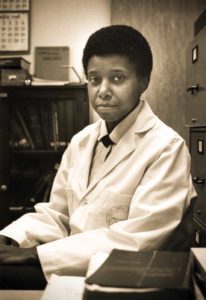The following is an excerpt by Simpson Library Cataloging and Processing Assistant Sarah Appleby ’06. She wrote the original for The Spinning Wheel, the blog of UMW Special Collections and University Archives, to commemorate Black History Month.
In 1968, Venus R. Jones became Mary Washington’s first African-American graduate. This year, on the 50th anniversary of her commencement, we have the opportunity to recognize an ambitious student who helped break down barriers at the University of Mary Washington.
Venus Jones did not originally set her sights on attending Mary Washington College. Growing up in Petersburg, Virginia, she planned from an early age to attend the University of Virginia and become a doctor. However, when the time came for her to apply, U.Va. informed her that it would not accept a woman into its pre-med program. Instead, administrators directed her toward Mary Washington, which at the time was consolidated with U.Va as its liberal arts school for women. Jones had never heard of the college, but she applied and was accepted.
Mary Washington didn’t formally desegregate until spring of 1964. Prior to integration, there had been only two African-American day students. After the school’s official decision to open enrollment to African-American students, Kay Estelle Savage became the first residential student of color. Kay was Venus’ freshman-year roommate, although she would transfer to Howard University after two years.
During her time at Mary Washington, Jones was one of five black residential students. She joined Chris Hall, Claudith “Dottie” Holmes, and twins Anita and Orita Whitehead. (See Orita Whitehead in “Get the Picture” on page 9.) A 1968 Bullet student newspaper article profiled the five students and their experiences on campus, touching on such topics as segregated housing and prejudice from classmates. Overall, the five reported few hostilities from white students on campus, but also noted that many “don’t even know there are [black students] on campus” and likely had never had a conversation with a person of color before. Jones called this “an absurd situation in an institution of higher learning.”
Jones earned her degree in chemistry in just three years. After graduation, she got her chance to attend U.Va.; she entered medical school there as the only black woman in her class. She graduated from medical school in 1972, after which she relocated to Phoenix for an internship to provide health care to the indigenous population. Next, she did a residency in San Francisco, returned to U.Va. for a neurology residency, and completed an epilepsy fellowship. Jones then joined the U.S. Air Force, where she rose to chief of neurology over three military hospitals.
Venus Jones excelled as a doctor, continuing to display the same intelligence and drive she showed as a young Mary Washington student. While in the Air Force, she was a neurology consultant to the surgeon general. She also served on medical missions to Haiti and worked with the Prince George’s County Search and Rescue Team.
After retiring from the Air Force as a lieutenant colonel, Venus Jones moved to Mississippi, where she opened a neurology clinic in 1998. Sadly, she died in a car accident in May 2001.
Want to learn more about UMW’s history? UMW Libraries’ Special Collections and University Archives posts new Spinning Wheel content biweekly. Sign up to have regular blog updates delivered to your inbox at spinningwheel.umwblogs.org.

